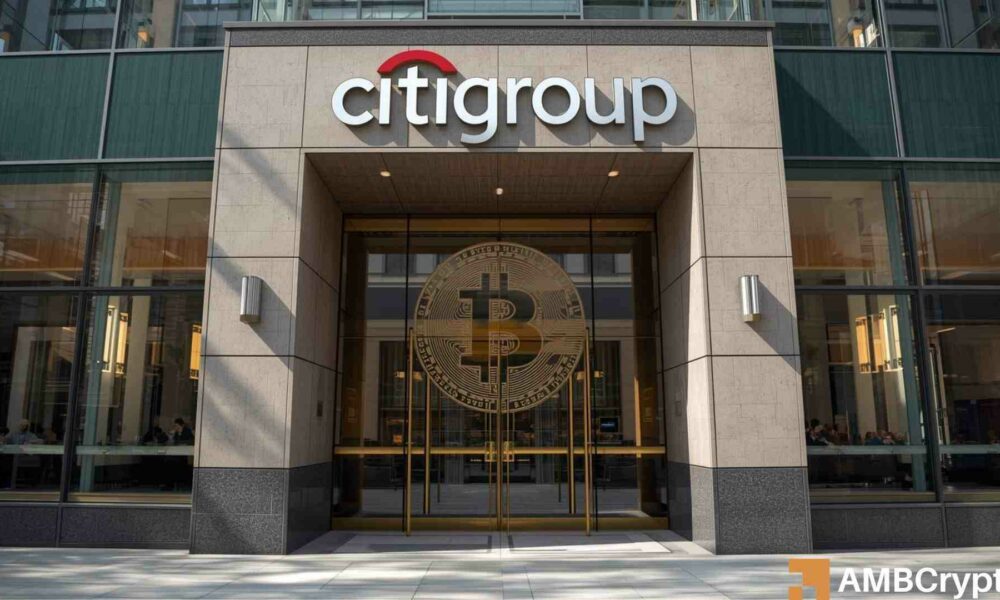Citigroup’s Bold Move into the Crypto Custody Market: What You Need to Know
In a significant development that underscores the growing importance of cryptocurrencies in traditional finance, Citigroup (Citi) has announced plans to expand its presence in the digital assets arena, focusing particularly on crypto custody services. Set to launch by 2026, this initiative signifies a strategic shift for Citi, aligning with broader market trends that emphasize the need for secure asset management solutions. This article delves into Citi’s motivations for entering the crypto sector, the implications of their custody solutions, and the competitive landscape they face.
The Rationale Behind Citigroup’s Crypto Expansion
Citi’s venture into cryptocurrency is largely driven by anticipated growth in stablecoins and crypto exchange-traded funds (ETFs). According to Biswarup Chatterjee, Citi’s global head of partnerships and innovation, the bank aims to offer credible custody solutions tailored for asset managers and other clients. With cryptocurrency-backed assets gaining traction, the firm recognizes the need to secure these investments amidst rising cyber threats. The presence of a regulated bank like Citi adds an extra layer of security that can significantly mitigate risks for investors.
Developing a Robust Custody Solution
Over the past three years, Citi has been working diligently on its crypto custody solution. The bank is exploring various strategies, balancing between in-house developed services and lightweight third-party partnerships to cover different asset segments. “Providing custody services for the high-quality assets backing stablecoins is our first area of focus,” Chatterjee states. This approach not only caters to the current market demand but also positions Citi as a credible player in the evolving financial landscape.
Capitalizing on Regulatory Changes
The recent enactment of the GENIUS Act, which mandates stablecoin issuers in the United States to back their tokens with stable reserves like treasury bills, presents a unique opportunity for Citi. As the supply of stablecoins has surged by over $50 billion since the law was passed, Citi’s alignment with regulatory frameworks positions it favorably in a market that is projected to reach a $2 trillion market cap by 2028. By focusing on reserves that back stablecoins, Citi is not only addressing the immediate needs of their clients but is also setting a foundation for future growth.
Expanding Crypto Ventures
Citi’s commitment to the cryptocurrency sector goes beyond custody services. The bank has recently launched Citi Token Services, aimed at facilitating blockchain-based cross-border payments for its clients in the U.S. and UK. Additionally, Citi has made investments in a stablecoin payment platform named BVNK, further emphasizing its intention to become a significant player in the crypto ecosystem. This multi-pronged strategy underlines the bank’s proactive approach to understanding and navigating the rapidly evolving digital asset landscape.
Facing a Competitive Landscape
Despite Citi’s robust plans, the competition in the crypto custody and ETF markets is intensifying. Notably, companies like Circle and Ripple have already applied for state-chartered trust licenses, allowing them to custody their own reserves independently. In the ETF space, while traditional players like BNY Mellon are exploring crypto custody, firms such as Coinbase hold a significant market share, especially concerning Bitcoin and Ethereum ETFs. As more crypto-native firms expand into the custody segment, it remains uncertain how Citi will establish a competitive edge.
Conclusion: Prospects for Citigroup in Crypto
As Citi prepares to enter the crypto custody market, its strategic emphasis on regulatory compliance and innovative solutions could position it as a key player in the sector. The bank’s extensive history and resources provide a solid foundation for tackling the challenges posed by an increasingly crowded market. However, the effectiveness of its strategies will ultimately depend on execution and its ability to forge meaningful partnerships. If successful, Citigroup could not only enhance its service offerings but also significantly contribute to the maturation of the cryptocurrency industry, fostering a safer environment for institutional investors.


